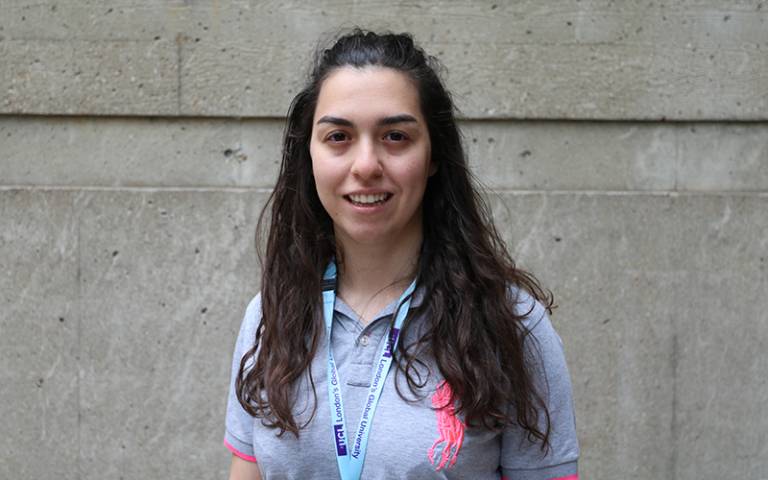Jessica is an Education and International Development: Conflict, Emergencies and Peace (CEP) MA student, class of 2023. She talks to us about her experience studying at IOE.
 What is your educational background?
What is your educational background?

My schooling has been culturally rich – studying between Beirut, Dubai and London – which has seated me at the edge of diversity and culminated in me joining an Master’s programme at IOE. I have completed an American high school Diploma in Lebanon and undertaken A-levels in London before joining university in Dubai for a Bachelor's degree in Education Studies with an emphasis on elementary level education.
What are your motivations for pursuing a graduate-level qualification?
There are several motives that have driven me to pursue a graduate-level degree, with a main focus on career advancement, expertise and personal development, as well as networking and building relationships. Without a doubt, a prominent graduate degree from IOE will land me a competitive job with higher benefits and will open doors for me to explore my interests even further.
“Choosing to specialise in Education during Emergencies, an emerging field of expertise, helped me deepen my knowledge in Education Studies, which has already opened so many respectable doors for me.
Lastly, one of the most joyful and fulfilling aspects of pursuing the qualification is connecting with people from all around the world and building relationships that will hopefully be present at different moments in my life. Speaking of that, London has done the job so well.
Why did you apply to UCL for graduate study?
In a nutshell, I believe UCL is a great opportunity to make more happen.
In my search for postgraduate programs, I came across the Education and International Development: Conflict, Emergencies and Peace (CEP) MA. As a potential educator with a deep interest in the humanitarian field of Education in Emergencies, I found that the variety of modules addressing contemporary challenges in Emergency Education affiliates with my career goals and would consolidate my growing understanding and knowledge of the field.
Also as an academic researcher, I was excited to be part of the Centre for Education and International Development (CEID) community that is aimed at generating new knowledge, while being critically reflexive about data and the contexts.
“Besides network building and connections with educators worldwide, I believe the international reputation and expertise of UCL in research and participatory practice boosted my decision to join an institution that would equip me with competitive skills to impact real-life problems.
What is the best thing about your course?
The most interesting element of the course is that the overall experience is rich. The common cluster of modules between all Education and International Development programmes enables me to meet people from different routes with varied experiences and knowledge; this will help feed into my own knowledge and experience. In this way, when we move into fieldwork and come across topics that are not within our expertise, we still get a grasp.
What do you find interesting about your field of study and what inspires you?
What continuously boosts my interest in Education during Emergencies and Conflicts is its unique combination of social, humanitarian and academic work. This makes the efforts you pour into it always rewarding because if you miss on an education target, you would at least hit the humanitarian and social aspect.
Living in Lebanon, my home country, which has a history of internal conflicts, as well as hosting refugees, made me realise that we are at the heart of Emergency Education.
“The hope of being one of those who contribute to social change and stability through education inspires me to commit to this field.
What are your career plans once you’ve completed your current programme of study at UCL?
“My career goal is to take part in education planning in emergency contexts, specifically designing response plans to crises that impact educational access and quality commonly by joining an INGO, NGO or governmental authorities.
I have been offered a place for summer internship with UCL to be part of a team who will work on behavioural change intervention by raising awareness and educating children around UNICEF’S ‘WASH’ program to reduce the transmission of diseases in schools. The project will take place in Uganda with other UCL students from the Engineering department who will work on installing sanitation facilities.
I am excited to be offered a hands-on opportunity by UCL to implement what I have learnt before jumping into the job market, and Uganda will be a great place to be!
Do you think studying at IOE is a good investment?
Without a doubt, pursuing a degree at IOE is one of the best investments I have made in my personal and academic development. It not only allowed me to access cutting-edge research projects at the tip of my fingers, but also to work alongside and learn from leading experts in the fields of Education.
Constantly ranking as the world’s top school for Education, I certainly sensed the level of support services and the range of resources IOE offers back to its students from specialised and renowned research facilities such as the Centre for Education Policy and Equalising Opportunities (CEPEO) and the Centre for Longitudinal Studies (CLS), to workshops and training that helped sharpen my skills and commitment to educational justice in conflict-affected contexts.
“I strongly believe studying at IOE has potentially one of the highest return on investment one can make.
Have you undertaken any networking opportunities either as part of your degree or outside of your studies?
Being part of several societies and clubs, I have participated in many networking events, some of which were limited to IOE students. For example, I joined several seminars, conferences and roundtable events, where I was able to meet peers across various disciplines within education.
The majority of networking events were social and cultural.
“Speaking of culture, a unique social event we (CEP students) initiated was trying out students’ national dishes across London’s restaurants.
Thinking of my place of origin, I never thought I would try an authentic Afghani fruit salad in my life!
What is it like studying in London and do you think it has benefited your studies? Why?
Studying in London has been an exciting and enriching experience, offering me a unique combination of academic, cultural and social opportunities.
“This city hosts some of the world’s most prestigious schools, such as UCL, and has thus helped enrich my educational experience with the chance to access top facilities, network with diverse people and get introduced to different cultures around the world.
Studying in London has given me the chance to not only develop my academic skills, but also develop a broader understanding and appreciation of the field by volunteering to teach global refugees with different needs.
How do you think the system of learning/researching at UCL differs from that in your own country?
On a graduate level, I believe the learning process at UCL is more active with extensive discussions and diverse types of assessments, including real life projects. At IOE, there is also more scaffolding for students and several opportunities to meet with their tutors to discuss changes to their research and benefit from the professors, not only for a particular study but also for their potential research journey afterwards.
Last updated 24 July 2023.
 Close
Close


